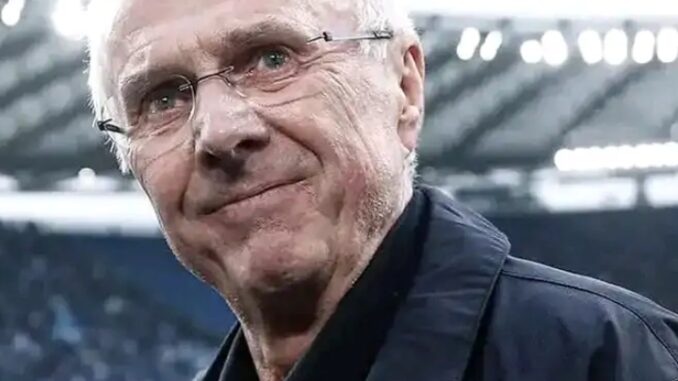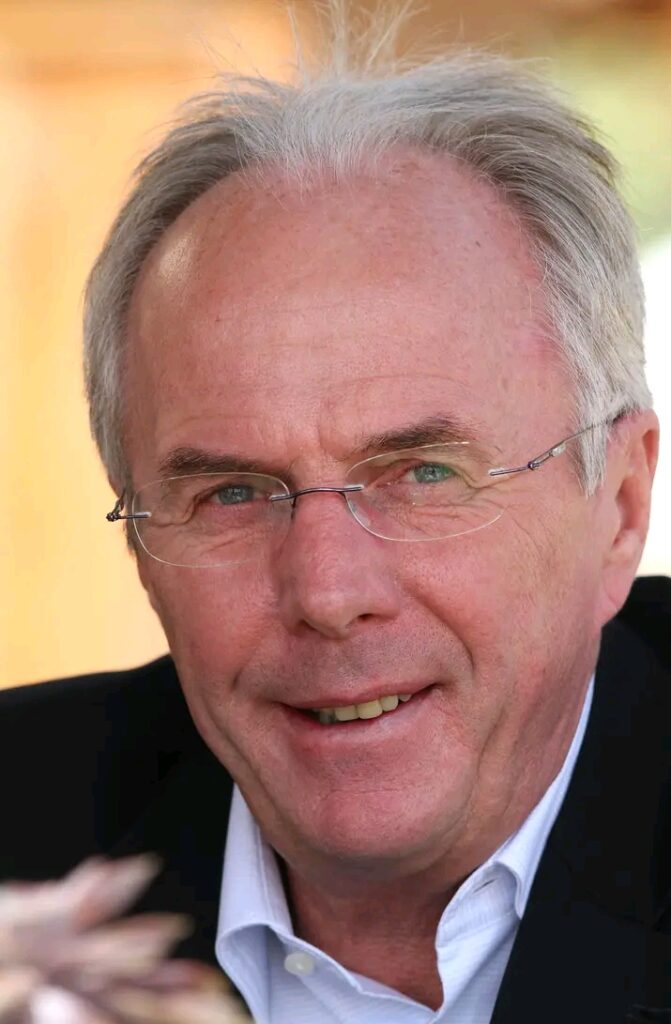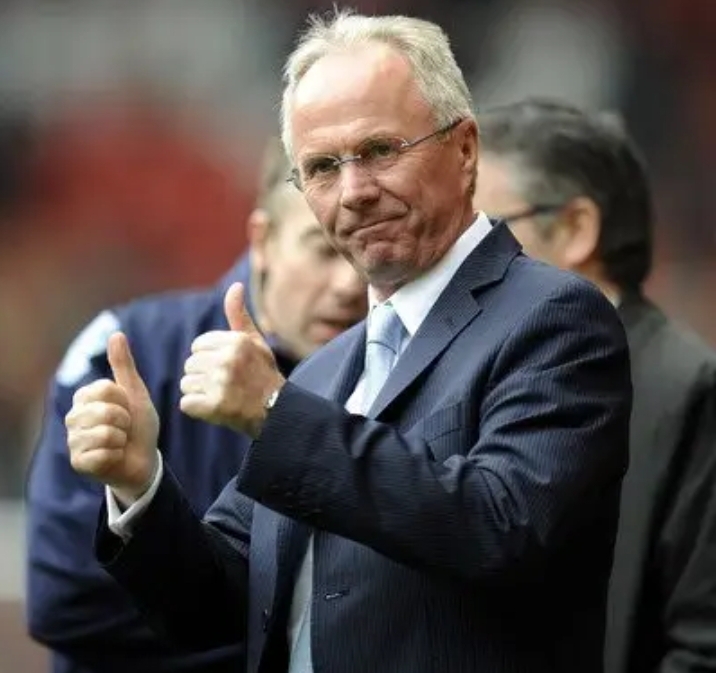
Sven-Göran Eriksson, born in February 1948 and passing away on August 26, 2024, was a talented Swedish footballer and coach. Transitioning from playing as a right-back, Eriksson ventured into club management from 1977 to 2001, achieving remarkable success by securing 18 trophies with various teams in Sweden, Portugal, and Italy. His accomplishments included winning the UEFA Cup, the European Cup Winners’ Cup (the competition’s final edition), and reaching the European Cup final.
Profile Summary
| Full Name: | Sven-Göran Eriksson |
| Date Of Birth: | February 5, 1948 |
| Place Of Birth: | Dunne, Sweden |
| Spouse: | Ann-Christine Pettersson(m. 1977; div. 1994) |
| Children: | 2 |
| Date Of Death: | August 26, 2024 |
| Place Of Death: | Sunne, Sweden |


Early Life
Sven-Göran Eriksson was born on February 5, 1948, in Sunne, Sweden, and grew up in Torsby, Värmland. His father, Sven, a bus conductor, and his mother, Ulla, who worked in a textile store, raised him.
His nickname “Svennis” originated from his younger brother’s early attempts to say his name, and this affectionate moniker stuck with him throughout his life, becoming the way he was commonly known in Sweden.
Career
Sven-Göran Eriksson began his football career in Sweden, starting with Torsby at just 16 years old before pursuing economics studies at Sifhälla.
Transitioning to playing for KB Karlskoga in 1972, he balanced his time on the field with teaching in Örebro. Influenced by manager Tord Grip’s English style of play, Eriksson retired from playing at 27 in 1975, recognizing his average defensive skills.
READ MORE: Marouane Fellaini Biography: Age, Net Worth, Mother, Father, Parents, Girlfriend, Retirement, Nationality, Stats, Clubs, Career
Moving into coaching, Eriksson joined Degerfors as an assistant to Tord Grip, eventually taking over as manager from 1977 to 1978. His success there led him to manage IFK Göteborg in 1979, where he implemented a tactical and disciplined style of play.
Under Eriksson’s leadership, the team achieved significant success, including winning the Svenska Cupen and securing a treble in the 1982 season, triumphing in the UEFA Cup.
Finding success abroad, Eriksson won titles with clubs like Benfica, Roma, and Sampdoria, showcasing his tactical acumen and ability to lead teams to victory. His managerial career took him to various clubs in Europe, where he continued to excel on the pitch.


In 1997, Eriksson joined Lazio in Italy, enjoying success with his assistant Tord Grip and winning multiple titles, including the Serie A title in 2000.
In 2001, Sven-Göran Eriksson made history by becoming England’s first foreign manager. Despite facing criticism and controversy, he led England to notable successes in major tournaments such as the 2002 FIFA World Cup and UEFA Euro 2004.
However, his time with the England national team concluded after the 2006 World Cup, leading him to manage clubs like Manchester City, Mexico, Ivory Coast, and Leicester City before venturing to coach in different countries.
READ MORE: Victor Boniface Biography: Age, Wife, Real Name, Parents, Awards, Net Worth, Girlfriend, State of Origin, Tribe, Salary, Girlfriend
Eriksson took on a fresh challenge in 2018 as the head coach of the Philippines national team, displaying his adaptability and willingness to work with diverse teams.
Despite facing obstacles in tournaments like the AFF Championship and the AFC Asian Cup, Eriksson’s experience and expertise helped enhance the team’s performance on the international stage. After stepping down as head coach, he continued to be involved as a consultant, emphasizing his commitment to football development worldwide.
Throughout his remarkable career, Sven-Göran Eriksson made a lasting impact on football, demonstrating his tactical intelligence, leadership skills, and love for the sport.
From his early days in Sweden to his managerial roles across Europe and beyond, Eriksson’s legacy as a football coach continues to inspire players, fans, and coaches globally.
Despite the challenges he faced, his dedication and drive have solidified his status as one of the most respected and accomplished managers in football history.


Sven-Göran Eriksson has managed several national teams and clubs which includes:
National Teams
England (2001 – 2006)
Ivory coast (2010)
Philippines (2018 – 2019)
Mexico (2008 – 2009)
Clubs
Degefors (1977–1978)
IFK Göteborg (1977 – 1982)
Benfica (1982 – 1984)
Roma (1984 – 1987)
Fiorentina (1987 – 1989)
Benfica (1989 -1992)
Sampdoria (1992 – 1997)
Lazio (1997 – 2001)
Manchester City (2007 – 2008)
Leicester City (2010 – 2011)
Guangzhou R&F (2013 – 2014)
Shanghai SIPG (2014 – 2016)
Shenzhen (2016 – 2017)
Philippines (2918 – 2019)
Personal Life
Eriksson was married to Ann-Christine Pettersson until their divorce in 1994. He then began a relationship with Nancy Dell’Olio in 1998 and relocated to London with her in 2001. Despite brief affairs, including one with Ulrika Jonsson in 2002, Eriksson ultimately returned to Dell’Olio.
In 2004, he had an affair with Faria Alam. Eriksson’s autobiography, My Story, was published in 2013. In 2016, he announced legal action against Mazher Mahmood, claiming a story had cost him the England coaching job.
Illness and Death
In a tragic turn of events, Eriksson disclosed his pancreatic cancer diagnosis in January 2024, stating that he likely had a year left to live.
Despite this grim prognosis, he made a poignant return to managing in March that year, leading the Liverpool Legends team in a charity match against Ajax. However, the relentless disease ultimately took his life on August 26, 2024, at 76 years old, at his home in Björkefors near Sunne.